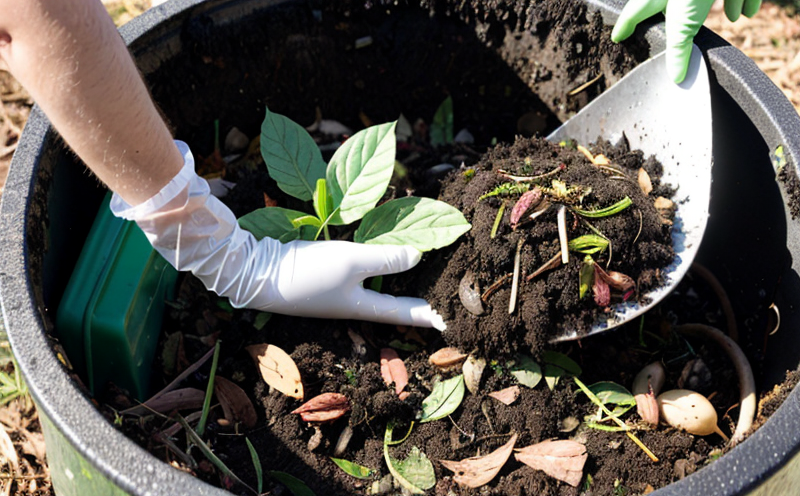EN 16087-2 Pathogen Reduction Testing in Compost
The European standard EN 16087-2 specifies the methodology for assessing the reduction of potentially harmful pathogens during composting processes. This test is crucial for ensuring that compost products meet safety standards and are suitable for use in agriculture, horticulture, and landscape management.
Pathogens such as bacteria (e.g., Salmonella, E. coli), viruses (enteroviruses, noroviruses), and fungi can pose significant risks if not adequately controlled during the composting process. The standard provides a robust framework for ensuring that these pathogens are effectively reduced to safe levels before the compost is sold or used.
The testing procedure involves several key steps:
- Sample Collection: Samples of the compost material are collected from various stages of the composting process, including initial mixing, turning, and final curing.
- Preparation: The samples undergo preparation to ensure they represent the conditions under which pathogens would be most active. This may include dilution or other handling techniques as specified in the standard.
- Incubation: Samples are incubated at controlled temperatures and humidity levels, simulating optimal growth conditions for pathogens.
- Detection: Pathogens are detected using culture-based methods (e.g., plating on selective media) or molecular techniques such as quantitative PCR. The standard outlines specific protocols for each method to ensure consistency and accuracy.
The primary goal of EN 16087-2 is to provide a standardized approach that can be reliably applied across different composting facilities, ensuring consistent pathogen reduction results. This is particularly important in the context of waste management where compost is often used as soil amendment or mulch.
Compliance with this standard is essential for producers and suppliers who want to ensure their products meet regulatory requirements and are safe for use. The test provides a clear pathway for demonstrating that pathogens have been sufficiently reduced, thereby enhancing public confidence in the safety of compost products.
The testing process can be complex, requiring specialized equipment and expertise. Our laboratory ensures that all samples are handled with care and analyzed using state-of-the-art techniques to provide accurate results. This is crucial not only for compliance but also for maintaining a high-quality product that meets customer expectations.
Benefits
Compliance with EN 16087-2 offers several significant advantages:
- Safeguarding Public Health: Ensures that compost products are free from harmful pathogens, reducing the risk of disease transmission.
- Regulatory Compliance: Meets stringent regulatory requirements set by environmental and health authorities across Europe.
- Market Access: Enables access to international markets where EN 16087-2 compliance is a prerequisite for trade.
- Quality Assurance: Provides assurance that the composting process effectively reduces pathogens, maintaining product quality.
- Consumer Confidence: Builds trust with consumers who value safe and reliable products.
- Competitive Advantage: Differentiates your company from competitors by demonstrating a commitment to safety and quality.
The benefits extend beyond compliance and market access. By ensuring pathogen reduction, you contribute to environmental sustainability by promoting the use of organic waste in composting processes. This helps reduce landfill waste and supports circular economy principles.
Quality and Reliability Assurance
The reliability of our EN 16087-2 testing services is underpinned by a commitment to quality assurance. Our laboratory adheres strictly to the standard's specifications, ensuring that every test is conducted with precision and accuracy.
- Accreditation: We are accredited according to ISO/IEC 17025, guaranteeing our technical competence in testing and calibration services.
- Experienced Staff: Our team comprises highly skilled professionals who have extensive experience in microbial testing.
- State-of-the-Art Equipment: We utilize the latest instrumentation and reagents to ensure consistent and reliable results.
- Data Transparency: All test data is transparently documented, allowing for easy verification and traceability.
We maintain strict quality control measures throughout the testing process. From sample collection to final reporting, every step is meticulously documented and reviewed to ensure accuracy and reliability. Our commitment to quality is reflected in our consistent ability to deliver accurate results that meet or exceed international standards.
Our laboratory's reputation for excellence in EN 16087-2 testing is built on years of experience and a track record of delivering reliable, compliant test results. Whether you're a small-scale producer or a large commercial facility, our services are tailored to meet your specific needs and ensure compliance with regulatory requirements.
International Acceptance and Recognition
The European standard EN 16087-2 is widely recognized and accepted across the globe, particularly in regions that follow EU regulations. Its broad acceptance ensures that your compost products are universally acknowledged as meeting stringent safety standards.
- Regulatory Compliance: Many countries around the world have adopted or are considering adopting EN 16087-2 to ensure pathogen reduction during composting processes.
- Market Access: Compliance with this standard opens doors to international markets where it is a key requirement for trade.
- Reputation Building: By adhering to the highest standards, you build a strong reputation in the market, which can lead to increased business opportunities.
- Consumer Trust: Compliance with this standard enhances consumer trust and confidence, leading to better customer satisfaction.
The global acceptance of EN 16087-2 underscores its importance as a benchmark for pathogen reduction in composting. By ensuring compliance, you not only meet regulatory requirements but also demonstrate your commitment to environmental sustainability and public health.
Our laboratory is at the forefront of this standard, offering robust testing services that are recognized and trusted by industry leaders worldwide. Whether you're looking to export your products or ensure local compliance, our expertise ensures that you meet all necessary standards with confidence.





